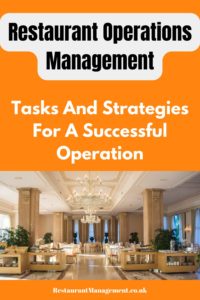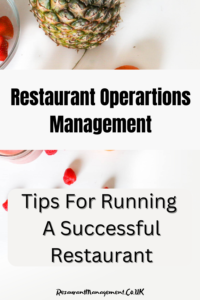First Published: 24 November 2022
Restaurant Operations Management
The restaurant industry is one of the most competitive industries in the world. Many people want to open their own restaurant, but it takes much more than just a good idea and some money to make it work. This article will discuss some Tasks And Strategies For Successful Restaurant Operations Management to succeed.
If you are considering opening your own restaurant, it is important that you know what you are getting into and have a plan for success. Restaurant managers and owners need to understand the operational tasks and strategies that will help them succeed.
The following list includes some of the major tasks that a restaurant manager needs to take care of:
- Hiring and training employees
Hiring and training the right people to perform well can be very time-consuming. But, with technology, companies can significantly reduce their workload in this area. Using a system that automates finding and screening candidates will allow employees to be hired quickly and make them enjoy working at your restaurant.
- Managing inventory in your restaurant
Managing inventory in your restaurant can be a hassle. Food, supplies, and labour costs can fluctuate, causing you to change prices on your menu. You may also not want to miss out on potential profits by selling out certain menu items.
It is important to handle customer complaints efficiently and effectively. To avoid customer loss, providing the customer with a satisfactory solution is important. If a complaint cannot be resolved, it might be necessary to create an apology letter that can be sent out.
- Budgeting for better restaurant finance
You are the owner or manager of a popular restaurant. You would like to improve your business by increasing revenue and lowering costs. You need to find a way to lower your costs while increasing revenue. One way you can do this is by changing your food delivery company. You can find a new company that is either more affordable or delivers faster, which will increase business.

Principles of Operations Management
There are many widely accepted principles of operations management. Most experts advise a focus on organization, risk management, and adaptation. We’ve outlined two prominent lists of principles by experts below:
Randall Schaefer, CPIM, described The 10 Principles of Operations Management in his presentation at the 2007 conference of the American Production and Inventory Control Society (APICS).
- Reality: There is no universal solution to the problems in your business.
- Organization: You must organize all aspects of production into a coherent whole.
- Fundamentals: Adhere to fundamentals, such as accurate inventory records.
- Accountability: People try harder when they’re held accountable.
- Variance: Variance is part of every process.
- Causality: Problems are often symptoms. Get to the root cause.
- Managed Passion: People with a passion for their jobs will drive your company.
- Humility: You don’t have to know everything.
- Success: Define success and change with the market.
- Change: Every manufacturing solution is temporary.
Operations Management Strategies
In addition to their responsibilities for everyday production, operations managers play a significant role in strategy. You will find several important strategies and tactics below:
- Analytics:
Analytics are crucial for effective planning, modifications, and decision-making. Efficiency measurements and effectiveness metrics are two popular types.
Inventory Analysis: ABC analysis, also known as Pareto analysis, is used to manage inventory in the supply chain. This technique separates inventory into three groups: A, B, and C.
The highest value and strictest regulations are found in Category A, whereas the lowest value and laxest controls are found in Category C.
- Challenges with Data:
Data is frequently segregated, which makes comparison challenging. However, more recent setups and technologies facilitate and support this process.
- Process Design:
It requires knowledge and effort to do research, make projections, and create a sound process, but the outcomes may be long-lasting. The finest forecasting frequently combines an examination of past data with an examination of current conditions.
- Collaboration Among Departments:
Operations management may efficiently work with the finance, sales, marketing, human resources, and other departments with good communication and collaboration. Nowadays, ecological soundness is a strategic and legal requirement for businesses. Despite all the advances in equipment and technology, managing people remains essential, even if they frequently do a variety of roles.

Restaurant Operational Daily Tasks
What is the day-to-day life of a restaurant?
The day-to-day operations of a restaurant are very demanding. The daily responsibilities involve:
- Managing inventory and food costs,
- Labour cost,
- Hiring,
- Training and scheduling employees,
- Cash control,
- Managing the costs and ordering supplies.
What operational skills does a restaurant manager need?
A restaurant manager is a person who manages the day-to-day operations of a restaurant. The duties of an operations manager vary depending on the type and size of the restaurant. Still, they typically include managing staff, monitoring inventory, ordering supplies, determining staffing needs, and overseeing food safety.
The operational tasks that an operation manager performs are often dictated by their management style. A hands-on management style will involve more hands-on tasks like cooking or cleaning. In contrast, a more hands-off approach will involve less physical labour and more managerial tasks like scheduling or budgeting.
A restaurant manager needs to be able to multitask, manage operations such as ordering, hiring and firing, lead a team of people and more. They need to have skills in marketing, finance, and cooking.
The restaurant manager is a vital organisation member responsible for managing the business. They need to have skills in marketing, finance, and man management.
The marketing skills will help them create advertising campaigns promoting the restaurant’s food. As for financial knowledge, they need to understand how much money they are making and how much money they are spending.
Restaurant management is the process of managing a restaurant. And making sure that it is profitable. The operational tasks include hiring, training and managing staff, scheduling labour hours, maintaining inventory, monitoring food and labour costs, controlling food waste, ordering supplies and equipment, developing marketing strategies and maintaining customer service.

Related Articles:
Effective Restaurant Operations
How To Become A Restaurant Manager
How To Improve Restaurant Profits
How To Make A Profit In Your Restaurant
Restaurant Management Structure
The Value of Operations Management
Operations management is an organisation’s engine room, planning and driving operations and services. Operations managers maximise efficiency, productivity, and profit, vital to a company’s growth, survival, and competitive edge.
Most companies have an operations department with many employees and a large budget. Restaurant companies are not exempt. Forbes magazine reported in 2011 that three-quarters of CEOs come from an operations background, which shows the importance of understanding how a company functions.
We can also see the importance of restaurant operations management in these aspects of a company’s success:
- Customer service
- Product or service quality
- Correctly-functioning processes
- Market competitiveness
- Technological advances
- Profitability
It’s no exaggeration to say everything depends on operations.
Restaurant operation management is at the heart of every restaurant. They ensure that products and services are delivered on time, in accordance with expectations, and at a cost that meets or exceeds budgeted expenses. Good operations management ensures not only high efficiency and productivity levels but also profitability.

Operations Management Functions and Roles
Operations management includes diverse functions and roles, which can differ based on industry and company size. To carry out these tasks well, operations managers must be organised, analytical, creative, resourceful, versatile, and have strong leadership skills.
Now more than ever, restaurant operation managers must be tech-savvy to compete in a rapidly changing market. Technical specialization can arm you with the analytical and problem-solving skills vital to succeeding in this field.
Here is a list of the major functions and roles required of a modern operations manager below:
- Planning and implementing manufacturing plants
- Managing projects
- Planning information systems
- Helping to design and develop products and services
- Managing inventory through the supply chain
- Managing delivery to customers promptly
- Optimizing quality control
- Conducting procurement and purchasing
- Managing logistics
- Managing transportation and distribution
- Managing and maintaining facilities
- Conducting enterprise resource planning (ERP)
- Forecasting for planning
- Capacity planning
- Navigating Industrial Labour Relations
- Analyzing the value chain
- Optimizing resource allocation
- Eliminating waste and bottlenecks
- Continuously improving processes
- Executing a company’s strategic plan

Here are eight key aspects of good operations management:
- Identification and analysis of processes and procedures: Operations managers need to understand how their company’s various processes function before identifying where improvements can be made. This information is then used to create improvement plans directly impacting performance and costs.
- Communication between departments: Proper communication is essential for coordinating activities across different parts of the business. It helps keep everyone informed about changes so they can adapt as needed, reduces misunderstandings, and avoids cascading failures caused by conflicting messages.
- Control over resources: Allocating resources efficiently within a restaurant is one of the most important responsibilities of an operational manager. Determining which tasks should be handled by which department(s), as well as assigning specific people to each task, is critical for ensuring timely completion while minimizing wastefulness (or “cost escalation”).
- Coordination among teams: A successful operation depends on team cooperation – staff must work together seamlessly to achieve common goals. Ensuring a clear line of authority, regular communications, and effective team coordination are hallmarks of successful operations management.
- Establishing fair priorities: When too much activity occurs simultaneously, deciding what must be done first is difficult. Operation managers must establish clear priorities and give each task its importance for the company to stay afloat.
- Ensuring timely delivery of products or services: Delivering on time is one of the most important responsibilities of any restaurant, and operations management plays an essential role in ensuring that deadlines are met.
- Measuring results: Restaurant operational managers need accurate information on their organisation is current performance and where improvement opportunities exist to identify areas where additional effort may be needed.
- Controlling costs: Although not always easy, effective cost control is essential for ensuring that a company’s resources are directed toward its most important priorities.
What companies are hiring for Restaurant Operations Manager jobs?
The following are some of the top employers now looking to fill positions for restaurant operations managers:
- Director of Operations – Event Caterer – Change Hospitality London. £95,000 per annum
- Operations Director – Restaurant & bar group – 190k plus bonus – COREcruitment International, N1. £190k per year + bonus
- Head of Operations – Contract Catering – Illume Recruitment. – The Bourne. From £65,000 to £75,000 per annum
- Head of Operations – Contract Catering – Illume Recruitment – Blackfriars. From £65,000 to £75,000 per annum
- Venue Operations ManagerChange Hospitality – South East London (SE1). From £45,000 to £50,000 per annum
Conclusion
The role of a restaurant operations manager is multifaceted and essential for the success of any dining establishment. By effectively managing staff, resources, and operations, they contribute significantly to maintaining quality standards, optimising profitability, and fostering a positive dining experience for patrons.
As the backbone of restaurant management, operations managers play a pivotal role in navigating challenges and driving innovation. Operations management involves planning, acting, and adapting to constantly changing environments. What sets a great operations manager apart is how well they can use these principles to direct their teams in making effective decisions and executing tasks to ensure sustained success in the competitive F&B industry.
Operations management is key for restaurant businesses to succeed in today’s economy and the future. If you have a good team and the right mindset, you can handle most tasks with ease and efficiency. Now that we’ve discussed some of the principles behind operations management, it’s time to start putting them into practice!
Restaurant Kitchen Management: A Guide To Being The Best In Your Field
(FAQ) Frequently Asked Questions And Answers
Maximising Efficiency in Restaurant Operations Management
What does a restaurant operations manager do?
The role of an operations manager is paramount in ensuring smooth functioning and optimal performance. A restaurant operations manager is the linchpin of a successful establishment, overseeing various facets of day-to-day operations. Their responsibilities encompass a wide array of tasks, including:
- Staff Management: Hiring, training, and supervising personnel to uphold service standards and ensure customer satisfaction.
- Inventory Control: Monitoring inventory levels, ordering supplies, and minimising waste to optimise cost-efficiency.
- Quality Assurance: “Quality Assurance” refers to ensuring the food is prepared, presented, and served to the highest possible standard, which involves maintaining strict quality control measures at every stage of the process, from the selection of ingredients to the final presentation of the dish. It is essential to ensure that the food meets the customers’ expectations and is safe to consume.
- Customer Relations: Addressing customer feedback, resolving complaints, and fostering positive relationships to enhance the dining experience.
- Financial Management: Budgeting, forecasting, and analysing financial data to maximise profitability and minimise expenses.
- Operational Efficiency: Streamlining processes, implementing SOPs (Standard Operating Procedures), and identifying areas for improvement to enhance efficiency.
What is the role of a F&B operations manager?
The Role of an Operations Manager in the Food & Beverage (F&B) Industry is pivotal in ensuring seamless operations and exceptional dining experiences. Their key responsibilities include:
- Menu Planning: Working with Head Chefs to create menus that align with customers’ preferences and current market trends.
- Hygiene and Safety Compliance: Ensuring compliance with health and safety regulations, maintaining cleanliness standards, and implementing food safety protocols.
- Vendor Management: Establishing partnerships with vendors, negotiating contracts, and sourcing high-quality ingredients at competitive prices.
- Performance Analysis: Analyse sales data, monitor key performance indicators (KPIs), and devise strategies for revenue growth and operational efficiency.
- Adaptability: Navigating seasonality, market fluctuations, and emerging trends to maintain competitiveness and sustain business growth.
What is the difference between an Operations manager and a General manager?
While the roles of an operations manager and a general manager may overlap in certain aspects, they serve distinct functions within a restaurant hierarchy:
- Operations Manager: Focuses primarily on day-to-day operations, ensuring smooth functioning and efficiency in various departments such as kitchen, service, and administration.
- General Manager: Takes a broader perspective, overseeing overall business strategy, financial planning, marketing initiatives, and long-term growth objectives.


